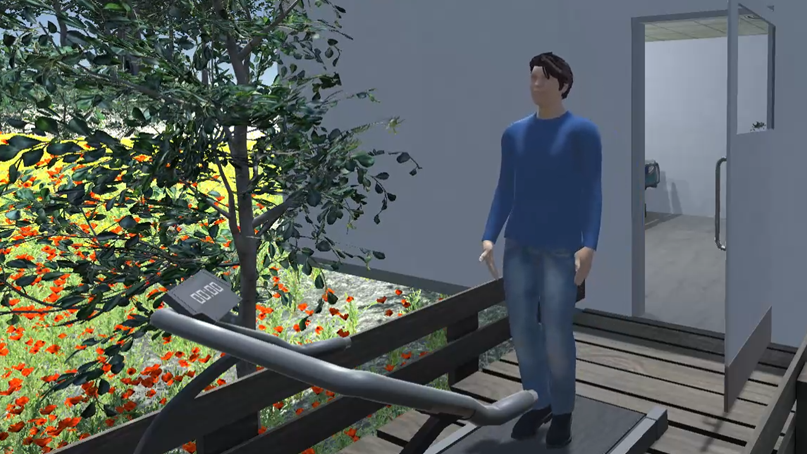VERARE : virtual reality at the service of the rehabilitation of patients with Covid-19
Date:
Changed on 22/06/2020

Actually, a few weeks before the COVID-19 pandemic,with Yoann Launey, anaesthetist in the surgical intensive care unit (ICU) at the Rennes University Hospital, we came up with a very innovative concept based on virtual reality to help patients in the ICU who are coming out of coma. Weakened, with difficulties in recovering walking, they currently benefit from very few means of rehabilitation at this stage. Then, we transformed this idea into a real scientific project with Doctor Mélanie Cogné, specialized in Physical and Rehabilitation Medicine at Rennes University Hospital, and collaborator in the Hybrid team. When the health crisis occured, we immediately thought that this project could serve as a basis for the rehabilitation of Covid-19 patients who find themselves in this terrible situation. We all greatly accelerated things to be able to get this application out as quickly as possible, and to meet the needs of the health crisis.
After hospitalization in ICU, about 50% of patients develop neuromyopathy, i.e. damage to nerves and muscles as a result of immobilization and the treatments used. Amongst patients affected by Covid-19 and hospitalized in ICU for several weeks, this pattern is similar or even higher. Neuromyopathy will delay their return to walking, their discharge from hospital and may reduce their autonomy in daily life. Virtual reality (VR) environments are already used for the assessment and rehabilitation of patients with neurological diseases, and they have proved their worth. Therefore, it seems appropriate to propose the use of virtual environments for this new type of use and consequently for the rehabilitation of Covid-19 patients.
With VERARE, the patient will be immersed in different virtual environments using a VR headset. He will be represented by an avatar, his virtual alter ego. He will see himself carrying out different motor tasks involving his lower limbs; for example, walking, jogging, avoiding obstacles, etc. We ask the patient to observe these actions and then imagine that he or she is performing them in the virtual environment. Our main hypothesis is that the observation of virtual actions, such as walking, and the progressive resumption of motor activity in VR, will allow a quicker start to rehabilitation, as soon as the patient leaves the ICU. The patient will then be able to carry out sessions in his room, or even from his hospital bed, in simple and secure conditions, hoping to obtain a final clinical benefit, either in terms of motor and walking recovery or in terms of hospital length of stay. This is a very innovative project, because to our knowledge virtual reality has never been used at this stage of patient care and for this type of rehabilitation in intensive care or physical and rehabilitation medicine departments.
Learders : Anatole Lecuyer, researcher and leader of Hybrid research team (common with Inria, CNRS, Université de Rennes 1 and INSA Rennes), Yoann Launey, anaesthetist physician in surgical intensive care unit at Rennes University Hospital, and Mélanie Cogné, Physician of Physical and Rehabilitation Medicine, University and University Hospital of Rennes.
Partners : Inria and CHU Rennes
#RV #reeducation #neurosciences
First of all, the project is actively followed within the Hybrid team: nearly 18 team members have volunteered to participate, in one way or another, in the design and development of the application ! Several permanent staff are heavily involved: Ferran Argelaguet, Inria research scientist, Valérie Gouranton, associate professor at INSA Rennes, Florian Nouviale, research engineer at INSA Rennes, and myself. Thanks to Inria's great responsiveness and the support of its research support services, we were able to recruit for this project very quickly: Justine Saint-Aubert for a post-doctorate, and Quentin Denis-Lutard, for an internship. We were also able to start purchasing equipment very quickly.
Regular meetings are held every week with Mélanie Cogné, medical doctor at the Rennes University Hospital and member of Hybrid team, to refine the project according to the needs expressed by the caregivers in Intensive Care Units, including Philippe Seguin, professor and head of the Surgical Intensive Care Unit and Jean-Marc Tadié, professor in the Medical Intensive Care Unit, as well as Isabelle Bonan, professor and head of the PRM Unit. At the same time, Mélanie Cogné drafted all the necessary legal documents, and the Rennes University Hospital treated them in record time. Work started at the end of April 2020, and we are aiming to deploy the first version of our application at the hospital in mid-June 2020.
If all goes well, the first patients will then be able to start using our virtual reality application at the Rennes University Hospital just two months after the project had been drafted ... which is a real achievement in itself!
VERARE members (alphabetique order) :
Anatole Lécuyer, Diane Dewez, Ferran Argelaguet, Florence Celant, Florian Nouviale, Gwendal Fouché, Justine Saint-Aubert, Mélanie Cogné, Quentin Denis-Lutard, Rafik Drissi, Rebecca Fribourg, Ronan Gaugne, Thomas Howard, Valérie Gouranton, Victor Mercado, Yoann Launey.